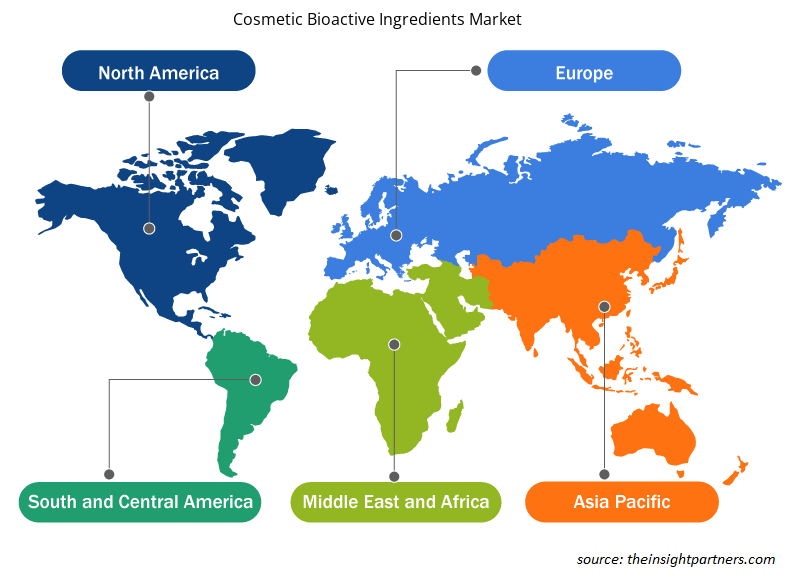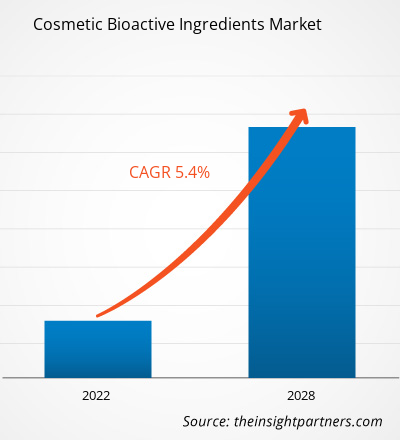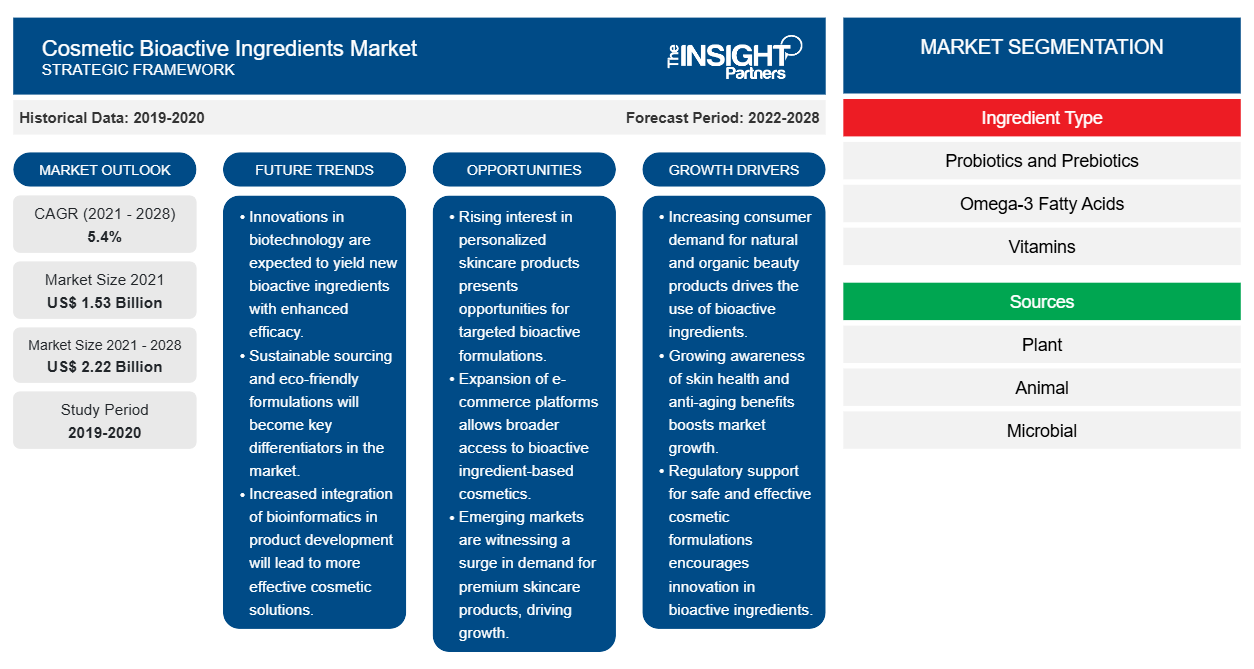Se proyecta que el mercado de ingredientes bioactivos cosméticos alcance los US$ 2.215,96 millones para 2028 desde los US$ 1.529,91 millones en 2021; se estima que crecerá a una CAGR del 5,4% entre 2021 y 2028.
Los cosméticos son productos elaborados para aplicar sobre la piel y el cabello con el fin de limpiar, embellecer, promover el atractivo o mejorar la apariencia. Entre los ingredientes activos que se suelen utilizar en este tipo de preparaciones, existe una tendencia mundial a incorporar productos de origen vegetal debido a su atractivo comercial, seguridad y rica composición, a menudo relacionada con un efecto sinérgico o multifuncional. Los extractos botánicos tienen un alto contenido de metabolitos secundarios que existen en plantas con una gran diversidad estructural. Tanto los flavonoides como los no flavonoides están relacionados con interesantes propiedades cosméticas como la fotoprotección, el antienvejecimiento, la hidratación, los antioxidantes, los astringentes, los antiirritantes y la actividad antimicrobiana. Con sus componentes bioactivos y acciones farmacológicas, se ha demostrado que estos ingredientes bioactivos proporcionan beneficios dermatológicos con posibles aplicaciones para el rejuvenecimiento de la piel, la fotoprotección, la cicatrización de heridas y más. El crecimiento del mercado de ingredientes bioactivos cosméticos se atribuye principalmente a la creciente preferencia por los ingredientes naturales en los productos cosméticos y al creciente número de ingredientes bioactivos que se lanzan al mercado. Sin embargo, los estrictos marcos regulatorios están restringiendo el crecimiento del mercado de ingredientes bioactivos cosméticos .
Personalice este informe según sus necesidades
Obtendrá personalización en cualquier informe, sin cargo, incluidas partes de este informe o análisis a nivel de país, paquete de datos de Excel, así como también grandes ofertas y descuentos para empresas emergentes y universidades.
-
Obtenga las principales tendencias clave del mercado de este informe.Esta muestra GRATUITA incluirá análisis de datos, desde tendencias del mercado hasta estimaciones y pronósticos.
Perspectivas del mercado
La creciente demanda de productos naturales por parte de los consumidores está impulsando la investigación relacionada con las sustancias bioactivas que se pueden utilizar en los cosméticos. Europa alberga algunos de los mayores fabricantes de ingredientes bioactivos y marcas de cuidado personal, como BASF y DSM. El lanzamiento de ingredientes bioactivos para la industria del cuidado personal está impulsando el crecimiento del mercado. En junio de 2019, BASF Care Creations lanzó tres nuevos ingredientes activos para el mercado de la belleza, que utilizan árboles de rambután que proporcionan hidratación y rejuvenecimiento a la piel. De manera similar, en abril de 2019, Lonza lanzó el ingrediente bioactivo H2OBioEV, que es una combinación única de ingredientes de origen natural (polisacáridos de Aphanothece Sacrum y Galactoarabinan) con agua y glicerina. El ingrediente confiere propiedades hidratantes al reponer humectantes esenciales, lo que facilita un entorno óptimo para la formación y el mantenimiento de una fuerte barrera proteica epidérmica.
Información basada en el tipo de ingrediente
Según el tipo de ingrediente, el mercado de ingredientes bioactivos cosméticos se divide en probióticos y prebióticos, ácidos grasos omega-3, vitaminas, carotenoides y antioxidantes, extractos de plantas, minerales, aminoácidos, proteínas y péptidos, entre otros. Es probable que el segmento de aminoácidos tenga la mayor participación del mercado en 2021. Sin embargo, se prevé que el segmento de extractos de plantas registre la CAGR más alta del mercado durante el período de pronóstico.
Perspectivas basadas en fuentes
El mercado de ingredientes bioactivos cosméticos, por fuentes, se segmenta en vegetales, animales y microbianos. Es probable que el segmento vegetal tenga la mayor participación del mercado en 2021. Sin embargo, se prevé que el segmento microbiano registre la CAGR más alta del mercado durante el período de pronóstico.
Las empresas que operan en el mercado de ingredientes bioactivos cosméticos están adoptando estrategias como lanzamientos de productos, fusiones y adquisiciones, colaboraciones, innovaciones de productos y cartera de productos para expandir su presencia en todo el mundo, mantener la marca y satisfacer la creciente demanda de los usuarios finales.
Perspectivas regionales del mercado de ingredientes bioactivos cosméticos
Los analistas de Insight Partners explicaron en detalle las tendencias y los factores regionales que influyen en el mercado de ingredientes bioactivos cosméticos durante el período de pronóstico. Esta sección también analiza los segmentos y la geografía del mercado de ingredientes bioactivos cosméticos en América del Norte, Europa, Asia Pacífico, Oriente Medio y África, y América del Sur y Central.

- Obtenga datos regionales específicos para el mercado de ingredientes bioactivos cosméticos
Alcance del informe de mercado de ingredientes bioactivos cosméticos
| Atributo del informe | Detalles |
|---|---|
| Tamaño del mercado en 2021 | 1.530 millones de dólares estadounidenses |
| Tamaño del mercado en 2028 | US$ 2.22 mil millones |
| CAGR global (2021-2028) | 5,4% |
| Datos históricos | 2019-2020 |
| Período de pronóstico | 2022-2028 |
| Segmentos cubiertos |
Por tipo de ingrediente
|
| Regiones y países cubiertos |
América del norte
|
| Líderes del mercado y perfiles de empresas clave |
|
Densidad de actores del mercado de ingredientes bioactivos cosméticos: comprensión de su impacto en la dinámica empresarial
El mercado de ingredientes bioactivos cosméticos está creciendo rápidamente, impulsado por la creciente demanda de los usuarios finales debido a factores como la evolución de las preferencias de los consumidores, los avances tecnológicos y una mayor conciencia de los beneficios del producto. A medida que aumenta la demanda, las empresas amplían sus ofertas, innovan para satisfacer las necesidades de los consumidores y aprovechan las tendencias emergentes, lo que impulsa aún más el crecimiento del mercado.
La densidad de actores del mercado se refiere a la distribución de las empresas o firmas que operan dentro de un mercado o industria en particular. Indica cuántos competidores (actores del mercado) están presentes en un espacio de mercado determinado en relación con su tamaño o valor total de mercado.
Las principales empresas que operan en el mercado de ingredientes bioactivos cosméticos son:
- Koninklijke DSM NV
- Compañía Ajinomoto, Inc.
- Roquette Hermanos
- ADM
- BASF SE
Descargo de responsabilidad : Las empresas enumeradas anteriormente no están clasificadas en ningún orden particular.

- Obtenga una descripción general de los principales actores clave del mercado de ingredientes bioactivos cosméticos
Mercado de ingredientes bioactivos cosméticos – porTipo de ingrediente
- Probióticos y prebióticos
- Ácidos grasos omega-3
- Vitaminas
- Carotenoides y antioxidantes
- Extractos de plantas
- Minerales
- Aminoácidos
- Proteínas y péptidos
- Otros
Mercado de ingredientes bioactivos cosméticos: por fuente
- Planta
- Animal
- Microbiano
Mercado de ingredientes bioactivos cosméticos por geografía
-
América del norte
- A NOSOTROS
- Canadá
- México
-
Europa
- Francia
- Alemania
- Italia
- Reino Unido
- España
- Resto de Europa
-
Asia Pacífico (APAC)
- Porcelana
- India
- Corea del Sur
- Japón
- Australia
- Resto de Asia Pacífico
-
Oriente Medio y África (MEA)
- Sudáfrica
- Arabia Saudita
- Emiratos Árabes Unidos
- Resto de Oriente Medio y África
-
América del Sur (SAM)
- Brasil
- Argentina
- Resto de América del Sur y Central
Perfiles de empresas
- Koninklijke DSM NV
- Compañía Ajinomoto, Inc.
- Roquette Hermanos
- ADM
- BASF SE
- Corporación FMC
- Biotecnología Vytrus
- Compañía: Cargill Inc.
- Corporación de tecnologías sensibles
- Dupont
- Análisis histórico (2 años), año base, pronóstico (7 años) con CAGR
- Análisis PEST y FODA
- Tamaño del mercado, valor/volumen: global, regional y nacional
- Industria y panorama competitivo
- Conjunto de datos de Excel
Informes recientes
Informes relacionados
Testimonios
Razón para comprar
- Toma de decisiones informada
- Comprensión de la dinámica del mercado
- Análisis competitivo
- Información sobre clientes
- Pronósticos del mercado
- Mitigación de riesgos
- Planificación estratégica
- Justificación de la inversión
- Identificación de mercados emergentes
- Mejora de las estrategias de marketing
- Impulso de la eficiencia operativa
- Alineación con las tendencias regulatorias























 Obtenga una muestra gratuita para - Mercado de ingredientes bioactivos cosméticos
Obtenga una muestra gratuita para - Mercado de ingredientes bioactivos cosméticos